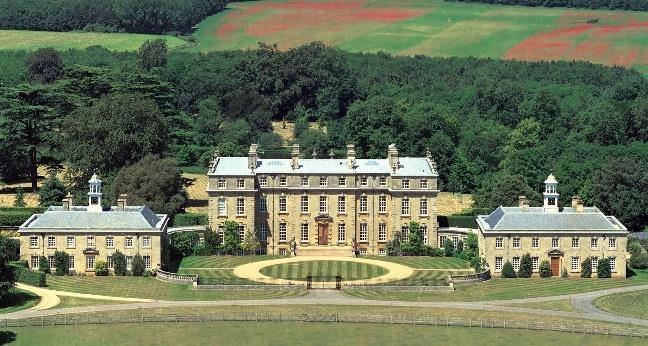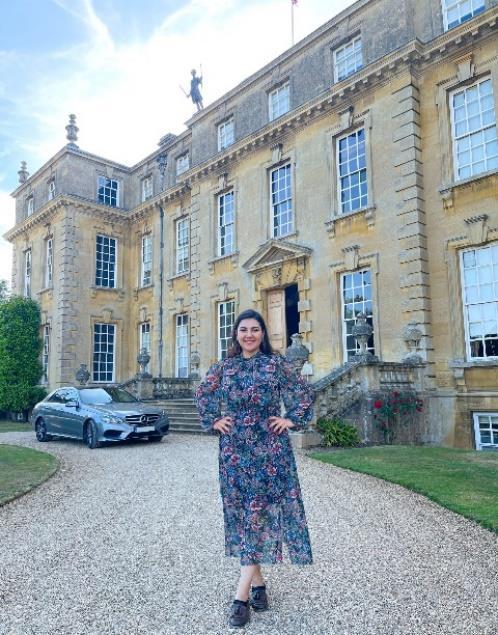
5 minute read
Ditchley Foundation (The
Practical Advice
Firstly, be prepared to learn on the job and not know everything initially (and that's ok!) - there
is a lot of information to take in. Secondly, I got the most out of the internship by also being
inquisitive about the work the team was doing. Be prepared to ask questions (obviously at appropriate times), or even ask to schedule in time with a team member to ask questions/go
through a task. This requires you to be pro-active. Thirdly, you must be able to manage your
tasks and deadlines as there will be multiple things going on at the same time. I would be happy
to give any future interns advice.
Ana-Diamond Aaba Atach, Balliol College, MPhil in Modern Middle Eastern
Studies, remote working
Work Projects
Ditchley Foundation offered three different tracks
for incoming interns. Interns, many of whom were
from Oxbridge and Russell group universities,
were then allocated to these three tracks, which
included 1) Networks, 2) Archives, and 3) Heritage.
Each track was different to the other, although at times there were some overlaps. I was
assigned to work in the Archives team, alongside four other interns.
My internship project entailed going through the extensive and historic Ditchley archives, all
the way from 1962, and reading through the Conference notes and Director's notes. I conducted an archival analysis of the dominant themes/issues brought up in these conferences,
such as climate change or the role of technology in our daily lives, and study the evolution of
thought and approach toward these themes at Ditchley. For example, Ditchley hosted many
conferences on the topic of Urban Development. However, their approach and priorities were
different in 1970s than they perhaps are now.The interns' duty was to review this change and
analyse how the problems were address, what solutions were offered, and what has been
different since then.

As a graduate student researching the Middle East, I chose
to focus on the topic of Modern Middle East. The Middle
East is unquestionably the most discussed region in the
history of the Ditchley conferences, with well over 100
discussions held since 1962 that either directly address
issues of the region or topics that broadly concern the
region. I reviewed over 20 conferences, many more
scholarly papers, did background research on all the
conference participants (many of whom are renowned
politicians, diplomats, business professionals and
academics), and then wrote a comprehensive report on my findings (5,000 word report). This
internship required the interns to be very independent and initiate their project within their
own timelines, interest, and ability. The support team, however, were always there if needed.
They were also very accommodating if you needed extra guidance or time, and our point of
contact was always available upon email or call.
Daily Life
This was a part-time role, which meant that I worked from 9 until 2pm from Mon-Thur. It
worked out well while I was still in Oxford, but during my travels this got a bit complicated. I
would occasionally work more than 20 hours per week, but the beauty of it was that I could
work at any time that was convenient for me.

Lasting Impressions
I enjoyed the experience very much, although I hope
there would have been more opportunities to meet
the other interns, our seniors, as well as the important
people that make Ditchley what it is - a global hub
where connections are made, problems are addressed,
ideas are born and solutions presented. One of the more memorable days of this internship
was when I was able to listen to Sir Tony Blair talk in person, and I briefly met diplomat Richard
Moore in passing. For someone at the beginning of their career in politics and diplomacy, this
was very exciting and motivating.
Practical Advice
This is an excellent internship if you are interested in history, archival research, and have an eye
for small details when going through vast number of dense documents. I certainly felt like the
internship improved my critical thinking and analytical skills, and it also kept me sharp during
the summer holiday with the intensive levels of reading and writing that was required.
Noah Hudson, Worcester College, BA Philosophy, Politics and Economics, Second
Year Undergraduate, remote working
Work Projects
My internship with The Ditchley Foundation consisted of two main streams of work. The first
was their 'Existing Networks' programme in which I was tasked with researching a range of
influential people who may be of interest when planning Ditchley's future conferences. This
area of work was all about formulating networks between people who may not otherwise
collaborate to tackle some of the world's most pressing issues. It consisted of open-source
research, gathering qualitative information about individual's careers, areas of expertise and
any relevant organisations they had worked for. Categorising these individuals into their areas
of expertise allowed us to formulate a database of the networks that are so fundamental to the
work that Ditchley does.
The second strand of work was the 'Quants' programme. This involved an evaluation of
Ditchley's current network database, attempting to highlight any areas for improvement and
exploring the ways in which the database could be utilised most effectively. A large proportion
of this work involved using Cypher code to investigate the database. Little experience with
coding was required and plenty of support and induction material was available in the first few
weeks whilst we became familiar with the system.
The two strands of work complimented each other nicely with a good balance of qualitative and
quantitative skills being applied to analyse, expand, and ultimately improve the networks that
Ditchley has created. There was also a blend of individual and group tasks as we were
responsible for our own research on the Networks programme but were often tasked with
presenting group findings in relation to the work on the Quants programme. I found this to
provide a nice variety of roles and responsibilities.
Daily Life
Given that the internship was completely
remote, I was slightly concerned before-hand
that I would struggle to feel fully immersed in
the experience and thought it might be hard to
get to know other interns on the programme.
However, shortly before the internship, we
were invited to Ditchley to have a look around
the grounds and this provided the perfect opportunity to meet those who we would be working
with for the next six weeks and get a feel for the organisation. This ensured an easy transition
into remote working as we were familiar with each other and didn't have to introduce ourselves
for the first time on zoom!
The internship was part-time so on the days I was working I would have 1-2 45-minute zoom
calls to attend where we would be presenting our research for the week, raising any concerns











